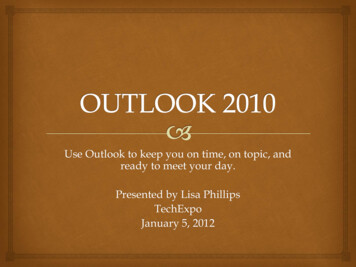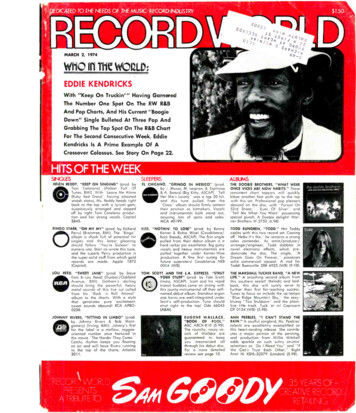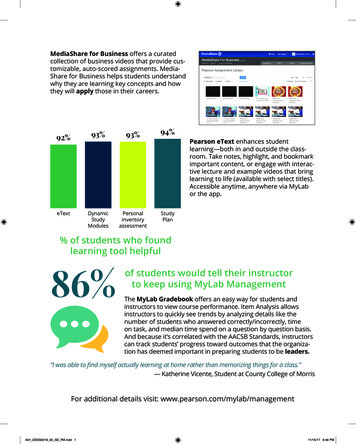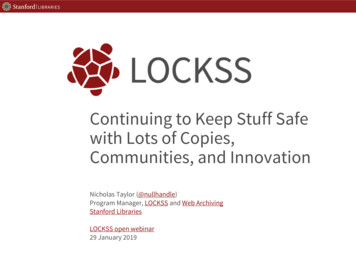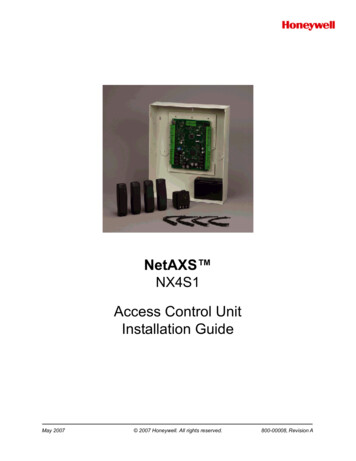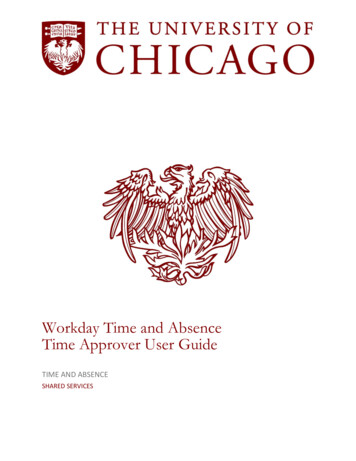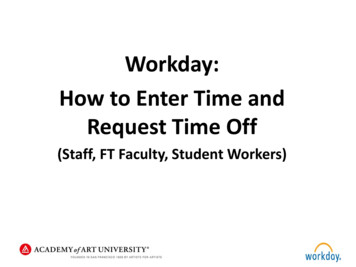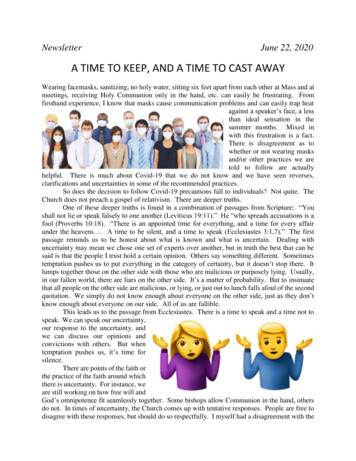
Transcription
NewsletterJune 22, 2020A TIME TO KEEP, AND A TIME TO CAST AWAYWearing facemasks, sanitizing, no holy water, sitting six feet apart from each other at Mass and atmeetings, receiving Holy Communion only in the hand, etc. can easily be frustrating. Fromfirsthand experience, I know that masks cause communication problems and can easily trap heatagainst a speaker’s face, a lessthan ideal sensation in thesummer months. Mixed inwith this frustration is a fact.There is disagreement as towhether or not wearing masksand/or other practices we aretold to follow are actuallyhelpful. There is much about Covid-19 that we do not know and we have seen reverses,clarifications and uncertainties in some of the recommended practices.So does the decision to follow Covid-19 precautions fall to individuals? Not quite. TheChurch does not preach a gospel of relativism. There are deeper truths.One of these deeper truths is found in a combination of passages from Scripture: “Youshall not lie or speak falsely to one another (Leviticus 19:11).” He “who spreads accusations is afool (Proverbs 10:18). “There is an appointed time for everything, and a time for every affairunder the heavens . A time to be silent, and a time to speak (Ecclesiastes 3:1,7).” The firstpassage reminds us to be honest about what is known and what is uncertain. Dealing withuncertainty may mean we chose one set of experts over another, but in truth the best that can besaid is that the people I trust hold a certain opinion. Others say something different. Sometimestemptation pushes us to put everything in the category of certainty, but it doesn’t stop there. Itlumps together those on the other side with those who are malicious or purposely lying. Usually,in our fallen world, there are liars on the other side. It’s a matter of probability. But to insinuatethat all people on the other side are malicious, or lying, or just out to lunch falls afoul of the secondquotation. We simply do not know enough about everyone on the other side, just as they don’tknow enough about everyone on our side. All of us are fallible.This leads us to the passage from Ecclesiastes. There is a time to speak and a time not tospeak. We can speak our uncertainty,our response to the uncertainty, andwe can discuss our opinions andconvictions with others. But whentemptation pushes us, it’s time forsilence.There are points of the faith orthe practice of the faith around whichthere is uncertainty. For instance, weare still working on how free will andGod’s omnipotence fit seamlessly together. Some bishops allow Communion in the hand, othersdo not. In times of uncertainty, the Church comes up with tentative responses. People are free todisagree with these responses, but should do so respectfully. I myself had a disagreement with the
previous bishop of the diocese, Bishop Wester. I thought one of his decisions would burden thepoor disproportionally. I clearly expressing my opinion, he listened, and he did not decide the wayI wanted him to decide. I thought he was wrong, but I followed his policy. It was not alwayseasy.I do not believe that following Bishop Wester’s policysomehow violated my conscience. Conscience informed me thatthere are sins against unity and that my opinion was precisely that,my opinion. He was not asking me to deny the faith, he was askingme to carry out a policy that would benefit the faith in one aspectbut in my opinion might run afoul of another element of the faith.What else could he, or anyone else, do in an uncertain situation?COVID-19 DELAYS RELIGIOUS EDUCATIONCONFIRMATIONS A SECOND TIMEOriginally Confirmation for our religious education classes was to be in the middle of May. Covid19 changed that so we rescheduled for June 26 and 27. Then our director of religious education,Mariana Lawrentz, discovered last Sunday that she had tested positive to Covid-19. Not only that,the Confirmation teachers had been in close contact with her (close contact is defined by theCenters for Disease Control as being less than six feet away from an infected person for at least 15minutes). Thank heaven that during last week’s class time preceding confessions for ourConfirmation students social distancing procedures were observed.Our Confirmation teachers are following testing procedures approved by the state healthdepartment. Anyone who may have come in close contact with someone who is positive for Covid19 should talk to their own physician, call the Intermountain Health Care Covid-19 hotline, 1-844442-5224, or do both. Symptoms of Covid-19 include fever, cough, difficulty breathing, muscleaches and chills, decreased sense of smell or taste, or a sore throat.Since those organizing Confirmation are in no position to be around crowds at the moment,we had no choice but to suspend Confirmation for a second time. This is part of the reality of thetimes in which we live, annoying as it may be. Please remember us in your prayers.MASKS AT MASSThe Diocese policy is to wear masks when entering andexiting the church and the Diocese “highly encourages”masks during the Mass. The reason is because whensinging, sneezing, or talking loudly spittle can easily travelmore than six feet and spittle spreads Covid-19.As of last Friday Washington County hadWashington County and a total of 767 Covid-19 casesincluding 51 new cases reported last week. WashingtonCounty is one of the areas in which Covid-19 cases th.org/covid/). On the positive side, Kane,Beaver, and Garfield counties are in the green risk phase.
CALL OR E-MAIL TO ATTEND A WEEKEND MASSThe faithful still have to keep six feet apart from other persons or families when going to church,so Masses are still less than half-capacity. To avoid “overloads” we need an idea of people whowould like to attend the various weekend Masses. Anyone who would like to attend Mass shouldcall the office (435-673-2604) or e-mail Fr. Dave (fatherdave@sgcatholics.com) with their names,phone numbers, and the number of people who wish to attend a particular Mass. Father will notcall to confirm your attendance at Mass; he will only call if there are too many people who wishto attend a particular Mass.Weekend Masses are at the regular times: 5:00 p.m. Saturday (English); 7:00 p.m.Saturday (Spanish); 9:00 a.m. Sunday (English); 11:00 a.m. Sunday (English);1:00 p.m. Sunday (Spanish). Please wear masks when entering and exiting thechurch, please follow the instructions of the ushers, and remember to take HolyCommunion in the hand.GRATITUDE AND THANKSAfter a while new things become routine and less attention is paid to them.Many hospitals are still in the middle of a long-term drive to encourage peopleto wash their hands before entering a patient’s room and when leaving apatient’s room.It takes a particular form of dedication to keep paying attention to what hasbecome routine. A big thanks to our ushers who continue to sterilize our pewsafter the weekend Masses and another big thanks to those who do the samething after weekday Masses and their time before the Blessed Sacrament. Eachone of them is keeping us all safer.THE SILVER ROSE VISITS OUR PARISH THIS WEEKThe Silver Rose is inspired by the roses that Our Lady of Guadalupe placed in the tilma of St. JuanDiego as he appeared before the bishop to ask that a church be built in honor of Our Lady. TheKnights of Columbus sent the Silver Rose to parishes throughout the country asking the Motherof God to pray for a greater respect for the sanctity of life. This certainly includes prayers for theend of abortion.This Wednesday the regular 7:00 p.m. Spanish Mass will include the Silver Rose and theMass will be followed by a prayer service featuring the rosary. This Thursday at 4:00 p.m. aspecial English Mass will be celebrated and it too will include the Silver Rose and a rosary willfollow the Mass). If and when the church is full, the doors will be closed for these two Masses.STEPHEN MINISTRY AT ITS FINEST“People often ask, ‘What exactly is a Stephen Minister?’ One way to put it is that Stephen Ministersare the After People. Stephen Ministers are there: . after the phone call you hoped you’d neverget. . after the funeral, when everyone has left and the emotions you’ve held at bay come crashing
in on you. . after the relationship falls apart and the bottom falls out of your life. . after the doctorsays, ‘I’m sorry, but there’s nothing more we can do.’ . after the nursing home director shakesyour hand and says, ‘Welcome to your newhome.’ . after the last child honks the horn,waves, and drives away—and the housesuddenly seems empty. . after the gavelcomes down, the handcuffs go on, and yourloved one is led away. . after the babyarrives, demanding more of you than you everdreamed possible. . after you find a pink slipwith your final paycheck. . after your familyand friends have heard your story one toomany times, but you still need to talk it out.Stephen Ministers are the After People. Theyare ready to come alongside you—or your friends, neighbors, coworkers, or relatives—and providecomfort and support for as long after as needed.”-From https://www.stephenministries.org/PDFs/after people.pdfSCHEDULING REMINDERS The church continues to be open for Adoration of the Blessed Sacrament Tuesday throughFriday from 9:00 a.m. to 3:00 p.m. The reason the church is not open on Mondays isbecause the cleaners are at work on Mondays.Drive through confessions continue this Saturday from 3:30 to 4:30 p.m. These areconfessions were the priests are in chairs in the parking lot in front of Scanlan and peopledrive up in the cars to confess.Our liturgical streaming schedule continues with daily Masses Monday through Fridaystreamed live on Facebook at 8:00 a.m. (English) and 7:00 p.m. (Spanish). After livestreaming these Masses remain on Facebook as do the Sunday Masses which are streamedlive at 11:00 a.m. (English) and 1:00 p.m. (Spanish). These Sunday Masses are also onYouTube at 4:00 p.m. on Sunday. For our links to Facebook and YouTube, please visitour parish website, https://saintgeorgecatholics.com.Weekend Masses have resumed, albeit with less people. Saturday Masses are at 5:00 p.m.(English) and 7:00 p.m. (Spanish). Sunday Masses are at 9:00 a.m. (English), 11:00 a.m.(English), and 1:00 p.m. (Spanish).
El Boletín Informativo22 de junio, 2020UN TIEMPO PARA MANTENER Y UN TIEMPO PARAABANDONARUsar máscaras faciales, desinfectar, sin agua bendita, sentarse seis pies separados el uno del otroen la Misa y en las reuniones, recibir la Sagrada Comunión solo en la mano, etc. puede serfácilmente frustrante. Por experiencia de primera mano, sé que las máscaras causan problemas decomunicación y pueden atrapar fácilmente el calor contra la cara de un orador, una sensaciónmenos que ideal en los meses de verano.Mezclado con esta frustración es unhecho. Existe desacuerdo sobre si usar ono máscaras y / u otras prácticas que senos dice que sigamos son realmenteútiles. Hay muchas cosas sobre Covid-19que no conocemos y hemos visto reveses,aclaraciones e incertidumbres en algunas de las prácticas recomendadas.Entonces, ¿la decisión de seguir las precauciones de Covid-19 recae en las personas? Noexactamente. La Iglesia no predica un evangelio del relativismo. Hay verdades más profundas.Una de estas verdades más profundas se encuentra en una combinación de pasajes de las Escrituras:"No se mentirán ni hablarán falsamente el uno al otro (Levítico 19:11)". El que difundeacusaciones es un tonto (Proverbios 10:18). "Hay un tiempo designado para todo, y un tiempo paracada asunto bajo los cielos . Tiempo de callar y tiempo de hablar (Eclesiastés 3: 1,7). El primerpasaje nos recuerda que seamos honestos sobre lo que se sabe y lo que es incierto. Tratar con laincertidumbre puede significar que elegimos un grupo de expertos sobre otro, pero en realidad lomejor que se puede decir es que las personas en las que confío tienen una cierta opinión. Otrosdicen algo diferente. A veces la tentación nos empuja a poner todo en la categoría de certeza, perono se detiene allí. Agrupa a los del otro lado con los que son maliciosos o que mientendeliberadamente. Por lo general, en nuestro mundo caído, hay mentirosos del otro lado. Es unacuestión de probabilidad. Pero insinuar que todas las personas del otro lado son maliciosas, omienten, o simplemente fuera de sentido, caen en la segunda cita. Simplemente no sabemos losuficiente sobre todos los que están del otro lado, así como tampoco saben lo suficiente sobre todoslos que están de nuestro lado. Todos somos falibles.Esto nos lleva al pasaje de Eclesiastés. Hay un tiempo para hablar y un tiempo para nohablar. Podemos hablar de nuestra incertidumbre, nuestra respuesta a lo inseguro, y podemosdiscutir nuestras opiniones y convicciones con los demás. Pero cuando la tentación nos empuja, estiempo de silencio.Hay puntos de la fe o la práctica de la fe en torno a los cuales existe incertidumbre. Porejemplo, todavía estamos trabajando en cómo ellibre albedrío y la omnipotencia de Dios encajanperfectamente. Algunos obispos permiten lacomunión en la mano, otros no. En tiempos deincertidumbre, la Iglesia presenta respuestastentativas. Las personas son libres de estar endesacuerdo con estas respuestas, pero deben hacerlo
respetuosamente. Yo mismo tuve un desacuerdo con el obispo anterior de la diócesis, el obispoWester. Pensé que una de sus decisiones sería una carga desproporcionada para los pobres. Expreséclaramente mi opinión, él escuchó y no decidió la forma en que quería que él lo hiciera. Pensé queestaba equivocado, pero seguí su política. No siempre fue fácil.No creo que seguir la política del obispo Wester haya violado de alguna manera miconciencia. La conciencia me informó que hay pecados contra launidad y que mi opinión era precisamente eso, mi opinión. No meestaba pidiendo que negara la fe, me estaba pidiendo que llevara acabo una política que beneficiaría a la fe en un aspecto, pero en mi
UN TIEMPO PARA MANTENER Y UN TIEMPO PARA ABANDONAR Usar máscaras faciales, desinfectar, sin agua bendita, sentarse seis pies separados el uno del otro en la Misa y en las reuniones, recibir la Sagrada Comunión solo en la mano, etc. puede ser fácilmente frustrante. Por experiencia de primera mano, sé que las máscaras causan problemas de
